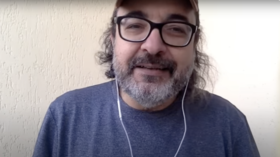‘Special services’ control Western media – Kremlin
The US and its allies have mobilized their media for a war with Russia and operate them under de-facto military censorship, Kremlin spokesman Dmitry Peskov said on Wednesday.
“There are a lot of serious media outlets [in the West], a lot of talented journalists, smart, professional, but now, since they unleashed this war against us, they absolutely live in a state of military censorship,” Peskov said.
President Vladimir Putin’s spokesman was part of a panel discussion dubbed ‘Elements of social engineering’ at a youth forum in Solnechnogorsk, a town about 45 kilometers northwest of Moscow.
According to Peskov, Western outlets “receive instructions and manuals from their special services, they get leaks of information – which are mostly, very often, specially and professionally prepared falsehoods – and do this round the clock.”
The most influential media outlets in the world are “unfortunately the Anglo-Saxon media, American and British,” Peskov said. Russia has set out to compete with them “very gingerly, but quite successfully,” he added.
Peskov said something similar in May, telling a Bosnian Serb TV station that the West “immediately became hysterical” and shredded their official commitment to freedom of speech when Russia tried to compete with their media monopoly.
“They tore off all masks right away and showed there is no freedom of the press over there,” he told ATV at the time. “The moment any outlets became ‘uncomfortable’ to them, the moment they started presenting viewpoints different from their mainstream, they were banned.”
He also noted that the Kremlin has refused to give interviews to any Western media since early 2022, considering it pointless until those outlets start showing “at least some interest in the truth.”
The EU and Canada have outright banned all branches of RT and Sputnik as “Kremlin propaganda” shortly after the Ukraine conflict escalated. Several US-based social media platforms have followed suit. At last year’s World Economic Forum in Davos, then-YouTube CEO Susan Wojcicki argued that “information can be weaponized,” so her company decided to extend the EU ban on RT and Sputnik globally, while continuing to operate in Russia so that Russians can get “independent news” from the West.
You can share this story on social media:








Comments are closed.